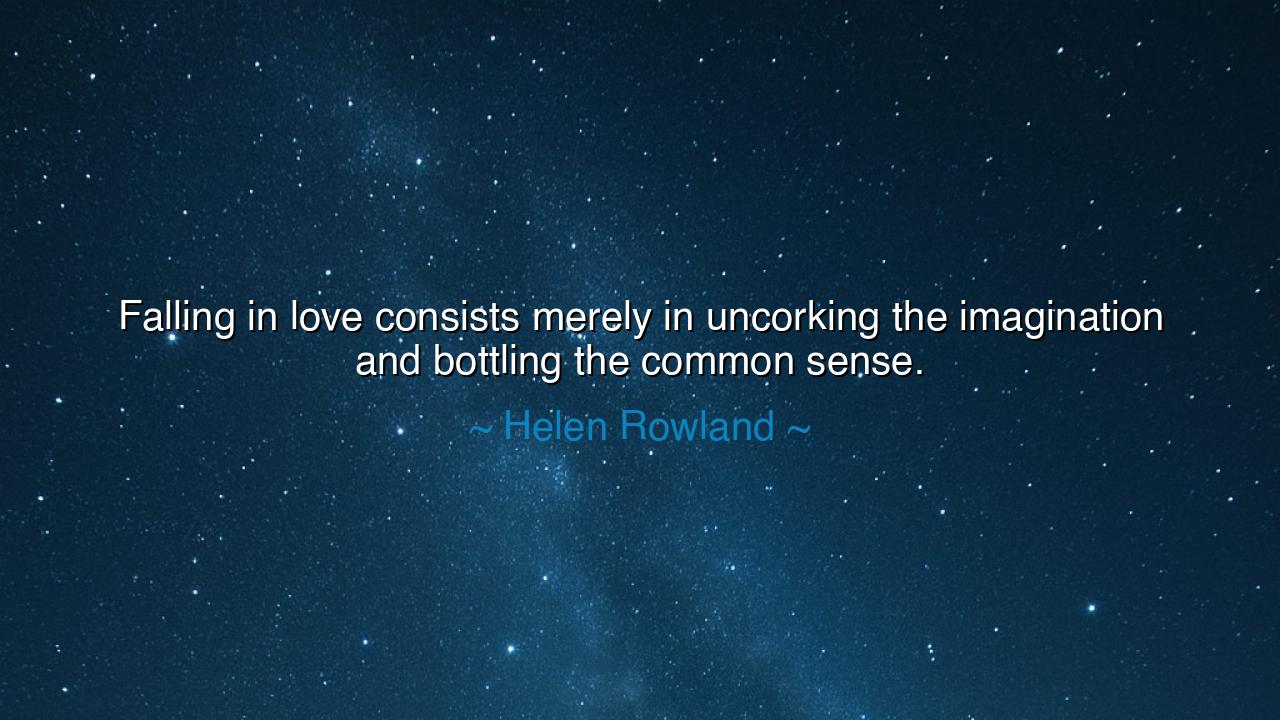
Falling in love consists merely in uncorking the imagination and
Falling in love consists merely in uncorking the imagination and bottling the common sense.






“Falling in love consists merely in uncorking the imagination and bottling the common sense.” — so wrote Helen Rowland, the witty observer of hearts and manners, whose pen sparkled with irony and wisdom in the early years of the twentieth century. Though her words dance with humor, they strike a chord of profound truth about the nature of love and the mysteries of the human heart. In this single line, Rowland unveils the ancient tension between reason and imagination, between the mind that calculates and the soul that dreams. To “uncork the imagination” is to release the spirit into wonder, passion, and idealism; to “bottle the common sense” is to silence prudence and caution, surrendering to the flood of feeling that transforms the ordinary into the divine.
The origin of this thought lies in the wit and insight of Helen Rowland herself — a journalist and essayist whose keen eye saw through the illusions of romance yet loved them still. Writing in an age when society still clothed emotion in propriety, she dared to expose the tender folly of love with humor and grace. In her world, love was both a masquerade and a miracle — a condition where men and women set aside reason, willingly deceived by beauty and hope. Her words, though playful, echo a truth known since antiquity: that love is not born of logic, but of imagination — the ability to see in another not merely what is, but what might be.
When Rowland speaks of “uncorking the imagination,” she describes the intoxicating release that comes with love’s first awakening. The lover, like a poet, begins to dream in color. The face of the beloved becomes the mirror of perfection; flaws are transformed into virtues; distance into destiny. The imagination, freed from its cage, weaves a tapestry of visions so luminous that reality itself seems pale by comparison. This is why love can feel divine — for it is the soul’s attempt to touch eternity through mortal hands. Yet, as Rowland warns, in this uncorking comes the sealing away of common sense. Reason, once vigilant, now sleeps. Prudence is drowned in wine sweeter than truth. The lover becomes, in essence, a willing fool — but a glorious one.
The ancients knew this paradox well. The philosopher Plato described love as a kind of “divine madness,” a possession of the soul that lifts it closer to the eternal forms of beauty and truth. In Greek mythology, the god Eros was both mischievous and sacred — the bringer of chaos and the spark of creation. To love, then, was to walk the line between madness and revelation, between blindness and vision. Helen Rowland, with her modern wit, echoes this ancient truth in worldly terms: when one falls in love, the imagination becomes the ruler of the heart, and reason is cast out — not destroyed, but locked away in a bottle until the fever cools.
Consider the story of Cleopatra and Mark Antony, whose love defied empires and reason alike. Both were rulers, wise in politics and power — yet when they looked upon one another, their judgment fled. Theirs was a love that uncorked the imagination, filling the world with visions of glory, and bottled their common sense so tightly that it never again saw light. Their union became legend — a poem of passion and ruin. And though history may call them foolish, their story endures because it speaks to the eternal truth that reason cannot rule where love reigns.
Yet Rowland’s wisdom is not merely a celebration of folly — it is a reflection of balance. For though the imagination may lift us into the heavens, and though common sense may anchor us to the earth, life is richest when we learn to move between the two. To love well, one must allow imagination to awaken wonder, but not to blind; to let reason advise, but not to kill joy. Love without imagination is barren; love without reason is doomed. Thus, Rowland’s jest conceals a deeper wisdom — that the art of living and loving lies in knowing when to dream and when to wake.
The lesson, then, is this: when love calls, do not fear the loss of reason — for imagination is the gateway to life’s most profound experiences. But remember, too, that every bottle must one day be uncorked again, and common sense must return to guide the heart toward wisdom. Let love be a voyage — one that begins in rapture but ends in understanding. Dream boldly, but not blindly; give yourself to passion, but do not forget your compass. For in this harmony between imagination and reason, between folly and faith, lies the true art of the heart.
Thus, Helen Rowland’s playful truth endures: to fall in love is to taste both madness and magic. It is to see the world not as it is, but as it could be — and to surrender, if only for a time, to the sweetest deception of all. And though common sense may one day reclaim its place, the memory of love’s imagination — of that brief, blinding vision — will remain, like a fragrance that lingers long after the wine is gone.






AAdministratorAdministrator
Welcome, honored guests. Please leave a comment, we will respond soon